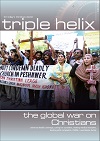Paul Adams insists that in the care for older people there's no substitute for costly love.
What will you be like in your old age? Strong to the end, or progressively failing in body or mind? Happy or sad, loved or ignored? Old age has become the new taboo topic. We make jokes about zimmer frames and stair lifts, and use euphemisms like 'senior moments' to describe memory loss. But we fight shy of too much detail and most families come to critical life choices largely unprepared.
It was not always so. A closer knit family structure, even up to World War 2, assumed that elderly, disabled and long term invalids would be cared for in the family. Indeed, one child would often assume their role in the family would be to look after poorly siblings, parents and other relatives. This role gave dignity to unmarried offspring and comfort to those who were less able. It was a world in which responsibilities came before rights and duty of care for others had priority over personal ambition.
Things are different now. With increased mobility, the welfare state, children leaving home before marriage, the pressure of fast-moving careers and increasing godlessness, personal rights are at the top of the agenda. Instead of children growing up with ailing grandparents and other relatives, the senior generation is encouraged to downsize progressively at a distance until they see out their days in residential 'care' where they will not interrupt their children's lifestyle too much.
Independence seems to be valued at every age: from the child who now has inadequate parental guidance, to single people who have inadequate real social networks, to the elderly who are expected to 'keep going under their own steam' as long as possible. And in one way that is right. We want to encourage responsibility so that people can feel competent and confident in how they live. The down-side is that none of us is able to be totally self-sufficient, because we are not God.
AW Tozer wrote, 'The Christian soon learns …that he may be safe when he puts himself in jeopardy; he loses his life to save it and is in danger of losing it if he attempts to preserve it. He goes down to get up. If he refuses to go down he is already down, but when he starts down he is on his way up. He is strongest when he is weakest, and weakest when he is strong ...' (1)
When we are not able to carry our load, God expects that others will carry the excess burden. The Bible is clear: 'Carry each other's burdens, and in this way you will fulfil the law of Christ.' (2) While a functionalised view of the human body may assume that the 'burden' relates to feeding, body care and mental stimulus, there is a significant relational element to bearing people's burdens. Emotions like love, understanding, sympathy, empathy, and compassion are not programmable mechanical functions. They express hearts that are bound together in love. That is what a family is supposed to be. It is a definition of the church of Jesus Christ.
We are now on the cusp of a new wave of depersonalisation of vulnerable people. Euthanasia is again being debated as the means of relieving society of the burden of the aged (along with a huge financial saving). Old people are feeling pressurised not to be a burden and seem to conspire passively with the view that as they are economically unprofitable, they therefore have no value.
Christians believe that Jesus Christ sacrificed himself when he accepted the burden of our sin. Being a burden is not a shameful state but the honest reality of all of our lives. The state or bank may provide some money, but without genuine love no burden is properly carried and no duty of care is properly discharged. Such love is always costly but it is the only kind of love which is fit for purpose.
Paul Adams is a dental surgeon and medical doctor who also works as a minister in Surrey.































